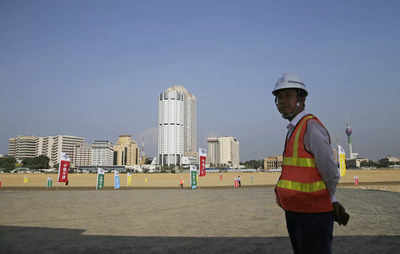[ad_1]

File photo: A Chinese construction worker stands on land that was reclaimed from the Indian Ocean for the Colombo Port City project, initiated as part of China’s ambitious One Belt One Road initiative, in Colombo, Sri Lanka.
COLOMBO: Sri Lanka’s Parliament on Thursday passed a law installing a powerful economic commission to administer a huge Chinese luxury oceanside development after altering elements of the bill ruled unconstitutional by the country’s top court.
The bill to create the Colombo Port City Economic Commission passed with a 149-58 vote in Sri Lanka’s 225-member Parliament.
The CHEC Port City Colombo company, a unit of China Communications Construction Company, invested $1.4 billion for reclamation of land and construction of infrastructure adjacent to the Port of Colombo.
In return, it obtained the right to use 62 hectares (153 acres) of marketable land on a 99-year lease from the Sri Lankan government, according to the project’s website. The planned project includes an integrated resort and casino and conference center zone, a marina, residential developments, a financial zone and green spaces.
The project has raised concerns in Sri Lanka and neighboring India that the development could become a virtual Chinese outpost or colony.
Sri Lanka’s government sees the project as a lifeline for an economy hit hard by the coronavirus pandemic.
Sri Lanka’s Supreme Court decided that some elements of the bill conflicted with the constitution, saying some clauses would need approval in a public referendum to become law. The highest court also suggested ways to amend the bill so it would conform with the constitution.
The government in response amended the bill so that a majority of the five to seven commission members appointed by the country’s president will be Sri Lankan. The government rejected an opposition proposal to have part of the commission’s funds allocated by Parliament to ensure that the commission stays under state supervision.
The law retained clauses giving the the commission the power to make rules and create businesses exemptions from laws related to taxes, customs, betting and gaming levies, employee terminations, entertainment taxes, foreign exchange and casino businesses.
China has provided billions of dollars in loans for Sri Lankan projects over the past decade – including a seaport, airport, highways, power stations and the port city. But that debt has deepened Sri Lanka’s debt burden.
Sri Lanka leased a Chinese-built port in the city of Hambantota, which is near the world’s busiest east-west shipping route, to a Chinese firm in 2017 for 99 years in a bid to recover from the heavy burden of repaying a loan the country took to build the facility.
FacebookTwitterLinkedinEMail
[ad_2]
Source link